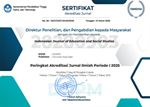Evaluating Food Security Policy Implementation: An Adaptive Governance Approach with Educational Implications
(1) Ayuni Rosa Sundari (Universitas Negeri Padang)
Indonesia
(2) * Rahmadani Yusran
 (Universitas Negeri Padang)
(Universitas Negeri Padang) Indonesia
(*) Corresponding Author
AbstractThis study evaluates the implementation of food security policies in Padang City through an adaptive governance approach, integrating William N. Dunn’s (2017) evaluation framework. The research aims to assess how local institutions, policy actors, and socio-ecological contexts influence the effectiveness, efficiency, equity, responsiveness, and appropriateness of food security programs. Using a descriptive qualitative method, data were gathered through in-depth interviews with officials from the Food and Fisheries Agency, local business actors, and beneficiary communities, alongside document analysis of regional policy reports. The findings indicate that while programs such as “Gerakan Pangan Murah” (GPM), “Pekarangan Pangan Lestari” (P2L), and “Cadangan Pangan Pemerintah Daerah” (CPPD) contribute to local food access, challenges include limited budgets, weak cross-sectoral coordination, and low community participation. The adaptive governance framework reveals that local food policies in Padang are moderately effective but not yet efficient or equitable due to institutional fragmentation and insufficient climate adaptation integration. The study recommends strengthening inter-agency collaboration, developing data-based food information systems, and promoting participatory food diversification strategies. For education, these findings highlight the importance of integrating food security awareness and adaptive governance into educational curricula to foster future leaders who can address these challenges effectively. |
Keywords
Full Text: PDF
Refbacks
- There are currently no refbacks.
Copyright (c) 2025 Ayuni Rosa Sundari, Rahmadani Yusran




